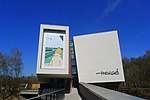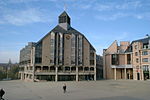UCLouvain Faculty of Architecture, Architectural Engineering and Urban Planning
2009 establishments in BelgiumCatholic University of LeuvenCatholic universities and colleges in BelgiumEducational institutions established in 2009Universities and colleges formed by merger in Belgium ... and 2 more
Universities in BelgiumUniversité catholique de Louvain

The Faculty of Architecture, Architectural Engineering and Urban Planning (in French: Faculté d'architecture, d'ingénierie architecturale, d'urbanisme), often called LOCI, is the 14th faculty of the University of Louvain, Belgium. It became an independent faculty in 2009, with the merger of three institutes founded between 1867 and 1882, and is active in Brussels (Saint-Gilles), Tournai and Louvain-la-Neuve.
Excerpt from the Wikipedia article UCLouvain Faculty of Architecture, Architectural Engineering and Urban Planning (License: CC BY-SA 3.0, Authors, Images).UCLouvain Faculty of Architecture, Architectural Engineering and Urban Planning
Rue Archimède,
Geographical coordinates (GPS) Address Nearby Places Show on map
Geographical coordinates (GPS)
| Latitude | Longitude |
|---|---|
| N 50.668372 ° | E 4.620832 ° |
Address
Secrétariat EPL
Rue Archimède 2
1348 (Louvain-la-Neuve)
Walloon Brabant, Belgium
Open on Google Maps








